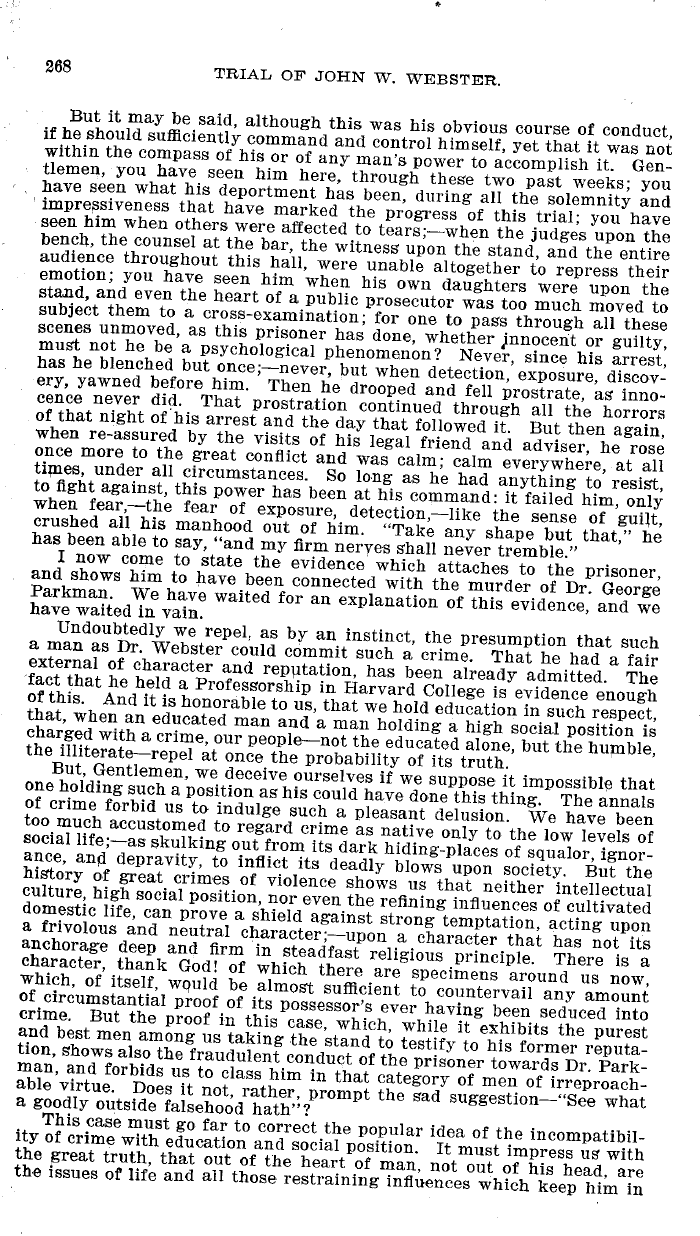|
a
268 TRIAL OF JOHN W. WEBSTER.
But it may be said, although this was his obvious course of conduct,
if he should sufficiently command and control himself, yet that it was not
within the compass of his or of any man's power to accomplish it. Gen-
tlemen, you have seen him here, through these two past weeks; you
have seen what his deportment, has been, during all the solemnity and
impressiveness that have marked the progress of this trial; you have
seen him when others were affected to tears; when the judges upon the
bench, the counsel at the bar, the witness upon the stand, and the entire
audience throughout this hall, were unable altogether to repress their
emotion; you have seen him when his own daughters were upon the
stand, and even the heart of a public prosecutor was too much moved to
subject them to a cross-examination; for one to pass through all these
scenes unmoved, as this prisoner has done, whether jnnocent or guilty,
must not he be a psychological phenomenon? Never, since his arrest,
has he blenched but once.-never, but when detection, exposure, discov-
ery, yawned before him. Then he drooped and fell prostrate, as inno-
cence never did. That prostration continued through all the horrors
of that night of his arrest and the day that followed it. But then again,
when re-assured by the visits of his legal friend and adviser, he rose
once more to the great conflict and was calm; calm everywhere, at all
times under all circumstances. So long as he had anything to resist,
to fight against, this power has been at his command: it failed him, only
when fear-the fear of exposure detection,-like the sense of guilt,
crushed all his manhood out of him. "Take any shape but that," he
has been able to say, and my firm nerves shall never tremble."
I now come to state the evidence which attaches to the prisoner,
and shows him to have been connected with the murder of Dr. George
Parkman. We have waited for an explanation of this evidence, and we
have waited in vain.
Undoubtedly we repel, as by an instinct, the presumption that such
a man as Dr. Webster could commit such a crime. That he had a fair
external of character and reputation has been already admitted. The
fact that he held a Professorship in Harvard College is evidence enough
of this. And it is honorable to us, that we hold education in such respect,
that, when an educated man and a man holding a high social position is
charged with a crime, our people-not the educated alone, but the humble,
the illiterate-repel at once the probability of its truth.
But Gentlemen, we deceive ourselves if we suppose it impossible that
one holding such a position as his could have done this thing. The annals
of crime forbid us to indulge such a pleasant delusion. We have been
too much accustomed to regard crime as native only to the low levels of
social life; as skulking out from its dark hiding-places of squalor, ignor-
ance, and depravity, to inflict its deadly blows upon society. But the
history of great crimes of violence shows us that neither intellectual
culture, high social position, nor even the refining influences of
cultivated
domestic life, can prove a hield against strong temptation, acting upon
a frivolous and neutral character-upon a character that has not its
anchorage deep and firm in steadfast religious principle. There is a
character, thank God! of which there are specimens around us now,
which, of itself, would be almost sufficient to countervail any amount
of circumstantial proof of its possessor's ever having been seduced into
crime. But the proof in this case, which, while it exhibits the purest
and best men among us taking .the stand to testify to his former reputa-
tion, shows also the fraudulent conduct of the prisoner towards Dr. Park-
man, and forbids us to class him in that category of men of irreproach-
able virtue. Does it not, rather, prompt the sad suggestion-"See what
a goodly outside falsehood hath"?
This case must go far to correct the popular idea of the incompatibil-
ity of crime with education and social position. It must impress us with
the great truth, that out of the heart of man, not out of his head, are
,the issues of life and all those restraining influences which keep him in
|

